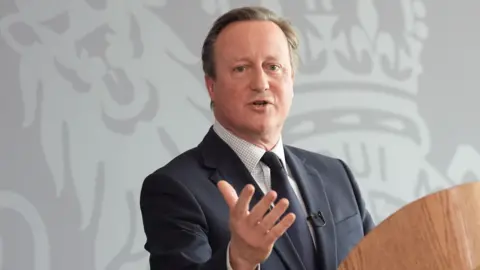 PA
PADavid Cameron has urged the UK to consider sanctioning two Israeli ministers as a way of “putting pressure” on the country to act within international law.
Speaking to the BBC’s Today programme, the former Conservative foreign secretary said before the election he had been “working up” plans to put sanctions on Finance Minister Bezalel Smotrich and National Security Minister Itamar Ben-Gvir.
He described the two men as “extremist” and said using sanctions would send a message to Israeli Prime Minister Benjamin Netanyahu that “this is not good enough and has to stop”.
The BBC has contacted Smotrich and Ben-Gvir for a response.
Lord Cameron said both men had “said things like encouraging people to stop aid convoys going into Gaza, they have encouraged extreme settlers in the West Bank with the appalling things they have been carrying out”.
Earlier this year, Smotrich suggested it might be “justified and moral” to starve Gazans and has called for Palestinian residents to leave and make way for Israelis who could “make the desert bloom”.
Asked why the planned sanctions did not go ahead, Lord Cameron, who was foreign secretary between 2023 and 2024, said he had been advised that it would have been “too much of a political act” during the election.
UK Foreign Secretary David Lammy has condemned comments by the Ben-Gvir and Smotrich as “entirely unacceptable”.
Speaking at a Labour conference event last month, he said: “We are very worried about escalatory behaviour, about inflamed tensions.
“I’m absolutely clear, if we have to act, we will act. I’m in discussions with G7 partners, particularly European partners, on that. I’m not announcing further sanctions today but that is kept under close review.”
Sanctions usually prevent individuals from either travelling to a country or accessing any money they might keep in the country.
Tom Keating from the Royal United Services Institute think tank told the BBC that putting sanctions on Ben-Gvir and Smotrich would be a “significant move” aimed at sending a “major political message” to Israel.
He added that there were “practical issues” as sanctions required “a lot of work” and that the Foreign Office’s sanctions director was already “heavily overworked” due to issues related to Russia.
‘Not a blank cheque’
Lord Cameron argued the UK government should seek to influence Israel by putting restrictions on some of its ministers instead of pursuing the “wrong path” of suspending arms exports.
Last month, the UK government restricted arms sales to Israel saying there was a “clear risk” the equipment could be used to commit serious violations of international law.
But Lord Cameron said restricting arms sales to Israel while simultaneously helping to protect the country from Iranian attacks “made no sense”.
The former PM said everyone wanted to see the conflict end, but “end in a sustainable way”.
He said Israel had faced attacks from Hamas in the south and Hezbollah in the north and it was right to back the country’s right to self-defence.
“But it is not a blank cheque, it is not unconditional,” he said.
“We do want to make sure aid gets through into Gaza, we do want to see the role of the UN in Lebanon to be respected.”



